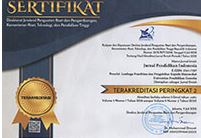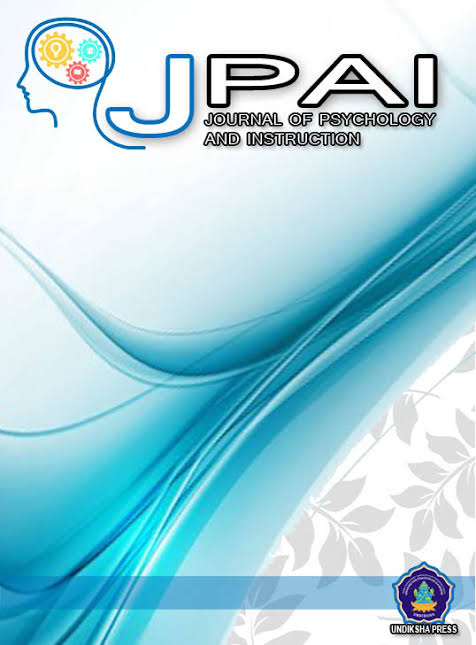Identification of the Identity of Remote Area Teacher as a Driving Force
DOI:
https://doi.org/10.23887/jpai.v6i1.36291Keywords:
identification, identity, teacher as a driving forceAbstract
Being a teacher is important and impactful for the society. The identity of the teacher reflects personal characteristics that contribute to the success of the learning process. Remote Area Teacher as a Driving Force (ATDF) is a program to advance Mappi Regency in the field of education. In the process of mentoring students, ATDF teachers need to know the identities they have. The purpose of this study was to determine the identity of the Remote Area Teachers as a Driving Force based on the types of teacher legitimization. The populations in this study were the Remote Area Teachers. The method used in this research was descriptive quantitative. The instruments used were questionnaires and interviews based on teacher legitimization, which were conducted on two ATDFs. The researcher used the data analysis model including: 1) Data Collection, 2) Data Reduction, 3) Data Display (Data Presentation), and 4) Conclusion Drawing / Verification. The results show that the ATDF teachers own the following types of identity: 1) Caring legitimization type, 2) Contextual legitimization type and 3) Psychological legitimization type. Those identities show that ATDF teacher 1) have a caring attitude towards student interests, 2) pay attention to students’ life which is reflected in the learning process in class and 3) focus on students' interests and behavior psychologically.
References
Affandi, L. H., Husniati, H., & Saputra, H. H. (2021). Exploring the source of well-being for high achiever students. Premiere Educandum : Jurnal Pendidikan Dasar Dan Pembelajaran, 11(1), 104. https://doi.org/10.25273/pe.v11i1.8767. DOI: https://doi.org/10.25273/pe.v11i1.8767
Al-Zoubi, S. M., & Younes, M. A. B. (2015). Low Academic Achievement: Causes and Results. Theory and Practice in Language Studies, 5(11), 2262. https://doi.org/10.17507/tpls.0511.09. DOI: https://doi.org/10.17507/tpls.0511.09
Anspal, T., Leijen, Ä., & Löfström, E. (2019). Tensions and the Teacher’s Role in Student Teacher Identity Development in Primary and Subject Teacher Curricula. Scandinavian Journal of Educational Research, 63(5), 679–695. https://doi.org/10.1080/00313831.2017.1420688. DOI: https://doi.org/10.1080/00313831.2017.1420688
Astuti, P. (2016). Practitioner of Cooperative Learning as Part of Novice Teachers’ Professional Identity. TEFLIN Journal: A Publication on the Teaching and Learning of English, 27(2), 132–152. https://doi.org/10.15639/10.15639/teflinjournal.v27i2/132-152. DOI: https://doi.org/10.15639/10.15639/teflinjournal.v27i2/132-152
Beijaard, D., Meijer, P. C., & Verloop, N. (2004). Reconsidering research on teachers’ professional identity. Teaching and Teacher Education, 20(2), 107–128. https://doi.org/10.1016/j.tate.2003.07.001. DOI: https://doi.org/10.1016/j.tate.2003.07.001
Bertus, H. (2019). Jurnal Ilmiah Ilmu Pendidikan. Jurnal Ilmiah Ilmu Pendidikan, 10(1), 45–60. https://doi.org/10.31932/ve.v10i1.351. DOI: https://doi.org/10.31932/ve.v10i1.351
Black, P., & Wiliam, D. (2018). Classroom Assessment and Pedagogy. Assessment in Education: Principles, Policy and Practice, 1–25. https://doi.org/https://doi.org/10.1080/0969594X.2018.1441807. DOI: https://doi.org/10.1080/0969594X.2018.1441807
Botha, M., & Onwu, G. (2013). Beginning Teachers ’ Professional Identity Formation in Early Science Mathematics and Technology Teaching : What Develops ? Journal of International Cooperation in Education, 15(3), 3–19. https://repository.up.ac.za/handle/2263/55852.
De Meuse, K. P., Dai, G., & Hallenbeck, G. S. (2010). Learning agility: A construct whose time has come. Consulting Psychology Journal, 62(2), 119–130. https://doi.org/10.1037/a0019988. DOI: https://doi.org/10.1037/a0019988
Dietmaier, C. (2017). Deskriptive Statistik. In Mathematik für Wirtschaftsingenieure. https://doi.org/10.3139/9783446454477.014. DOI: https://doi.org/10.3139/9783446454477
Gholami, K., Faraji, S., Meijer, P. C., & Tirri, K. (2020). Construction and deconstruction of student teachers’ professional identity: A narrative study. Teaching and Teacher Education, 97, 1–18. https://doi.org/10.1016/j.tate.2020.103142. DOI: https://doi.org/10.1016/j.tate.2020.103142
Hong, J., Francis, D. C., & Schutz, P. A. (2018). Research on Teacher Identity: Common Themes, Implications, and Future Directions. Research on Teacher Identity: Mapping Challenges and Innovations, 243–251. https://doi.org/10.1007/978-3-319-93836-3. DOI: https://doi.org/10.1007/978-3-319-93836-3_21
Huang, T. C., Lin, W., & Yueh, H. P. (2019). How to cultivate an environmentally responsible maker? A CPS approach to a comprehensive maker education model. International Journal of Science and Mathematics Education, 17, 49–64. https://doi.org/10.1007/s10763-019-09959-2. DOI: https://doi.org/10.1007/s10763-019-09959-2
Izadinia, M. (2013). A review of research on student teachers’ professional identity. British Educational Research Journal, 39(4), 694–713. https://doi.org/10.1080/01411926.2012.679614. DOI: https://doi.org/10.1080/01411926.2012.679614
Jennifer, J., & Mbato, C. L. (2020). Critical Incidents in Pre-Service Teachers’ Beliefs and Motivation to Become English Teachers: A Study of Teacher Professional Identity Construction. Ethical Lingua: Journal of Language Teaching and Literature, 7(1). https://doi.org/10.30605/25409190.172. DOI: https://doi.org/10.30605/25409190.172
Kizilaslan, A. (2019). The development of science process skills in visually impaired students: analysis of the activities. International Journal of Evaluation and Research in Education (IJERE), 8(1), 90–96. https://doi.org/10.11591/IJERE.V8I1.17427. DOI: https://doi.org/10.11591/ijere.v8i1.17427
Korthagen, F. A. J. (2004). In search of the essence of a good teacher: Towards a more holistic approach in teacher education. Teaching and Teacher Education, 20(1), 77–97. https://doi.org/10.1016/j.tate.2003.10.002. DOI: https://doi.org/10.1016/j.tate.2003.10.002
Lestari, N. D. (2018). Analisis Penerapan Kurikulum 2013 Dalam Meningkatkan Kualitas Pembelajaran Ekonomi Di Sma Negeri Se-Kota Palembang. Jurnal Neraca: Jurnal Pendidikan Dan Ilmu Ekonomi Akuntansi, 2(1), 68–79. https://doi.org/10.31851/neraca.v2i1.2190. DOI: https://doi.org/10.31851/neraca.v2i1.2190
Livingston, K., & Flores, M. A. (2017). Trends in teacher education: a review of papers published in the European journal of teacher education over 40 years. European Journal of Teacher Education, 40(5), 551–560. https://doi.org/10.1080/02619768.2017.1387970. DOI: https://doi.org/10.1080/02619768.2017.1387970
Lopes, A. (2019). Still building a better world? Research reflections on Teacher Education and Identity. Rethinking Teacher Education for the 21st Century: Trends, Challenges and New Directions, 53(9), 1689–1699. https://library.oapen.org/bitstream/handle/20.500.12657/23733/1006411.pdf?sequence=1#page=27.
Miles, M. B., Huberman, A. M., & Saldaña, J. (2018). Qualitative data analysis: A methods sourcebook. Sage Publications.
Pennington, M. C., & Richards, J. C. (2016). Teacher Identity in Language Teaching: Integrating Personal, Contextual, and Professional Factors. RELC Journal, 47(1), 1–19. https://doi.org/10.1177/0033688216631219. DOI: https://doi.org/10.1177/0033688216631219
Purwati, E., & Akmaliyah, M. (2016). Hubungan antara Self Efficacy dengan Flow Akademik pada Siswa Akselerasi SMPN 1 Sidoarjo. Psympathic : Jurnal Ilmiah Psikologi, 3(2), 249–260. https://doi.org/10.15575/psy.v3i2.1113. DOI: https://doi.org/10.15575/psy.v3i2.1113
Reza, M., Puspita, K., & Oktaviani, C. (2021). Quantitative Analysis Towards Higher Order Thinking Skills of Chemistry Multiple Choice Questions for University Admission. Jurnal IPA & Pembelajaran IPA, 5(2), 172–185. https://doi.org/10.24815/jipi.v5i2.20508. DOI: https://doi.org/10.24815/jipi.v5i2.20508
Richardson, P. W., & Watt, H. M. G. (2018). Teacher Professional Identity and Career Motivation: A Lifespan Perspective. In Springer International Publishing, 37–47. https://doi.org/10.1007/978-3-319-93836-3. DOI: https://doi.org/10.1007/978-3-319-93836-3_4
Robandi, B., Kurniati, E., & Puspita Sari, R. (2019). Pedagogy In The Era Of Industrial Revolution 4.0. 239, 38–46. https://doi.org/10.2991/upiupsi-18.2019.7. DOI: https://doi.org/10.2991/upiupsi-18.2019.7
Singh, G., & Richards, J. C. (2006). Teaching and Learning in the Language Teacher Education Course Room:: A Critical Sociocultural Perspective. RELC Journal, 37(2), 149–175. https://doi.org/10.1177/0033688206067426. DOI: https://doi.org/10.1177/0033688206067426
Upa, Y., & Mbato, C. L. (2020). English Teacher Identity Construction: Indonesian Teachers’ Motivation and Strategies in Teaching English for Special Needs Students. PROJECT (Professional Journal of English Education), 3(2), 311. https://doi.org/10.22460/project.v3i2.p311-321. DOI: https://doi.org/10.22460/project.v3i2.p311-321
Van Kan, C. A., Ponte, P., & Verloop, N. (2013). How do teachers legitimize their classroom interactions in terms of educational values and ideals? Teachers and Teaching: Theory and Practice, 19(6), 610–633. https://doi.org/10.1080/13540602.2013.827452. DOI: https://doi.org/10.1080/13540602.2013.827452
Viskovic, A., & Robson, J. (2001). Community and Identity: Experiences and dilemmas of vocational teachers in post-school contexts. Journal of In-Service Education, 27(2), 221–236. https://doi.org/10.1080/13674580100200180. DOI: https://doi.org/10.1080/13674580100200180
Wulandari, A. (2020). Implementation of the 2013 Curriculum Based on a Scientific Approach (Case Study at SD Cluster II Kintamani). International Journal of Elementary Education, 4(3), 422. https://doi.org/10.23887/ijee.v4i3.28172. DOI: https://doi.org/10.23887/ijee.v4i3.28172
Yang, J., Zhang, X. L., & Su, P. (2019). Deep-Learning-Based Agile Teaching Framework of Software Development Courses in Computer Science Education. Procedia Computer Science, 154. https://doi.org/10.1016/j.procs.2019.06.021. DOI: https://doi.org/10.1016/j.procs.2019.06.021
Yazan, B. (2019). Toward identity-oriented teacher education: Critical autoethnographic narrative. TESOL Journal, 10(1), 1–15. https://doi.org/10.1002/tesj.388. DOI: https://doi.org/10.1002/tesj.388
Yuliyana, Y. (2019). The Identity Construction of Newcomer Teachers in English Education Through Reflective Writing. BAHTERA : Jurnal Pendidikan Bahasa Dan Sastra, 18(2), 148–154. https://doi.org/10.21009/bahtera.182.04. DOI: https://doi.org/10.21009/BAHTERA.182.04
Zacharias, N. T. (2010). The teacher identity construction of 12 Asian NNES teachers in TESOL graduate programs. Journal of Asia TEFL, 7(2). https://search.proquest.com/openview/b106aec78a0e0116c05c5e7608371c20/1?pq-origsite=gscholar&cbl=4424407.
Zhang, H., Yu, L., Ji, M., Cui, Y., Liu, D., Li, Y., Liu, H., & Wang, Y. (2020). Investigating high school students’ perceptions and presences under VR learning environment. Interactive Learning Environments, 28(5), 635–655. https://doi.org/10.1080/10494820.2019.1709211. DOI: https://doi.org/10.1080/10494820.2019.1709211










